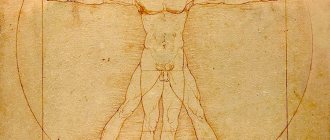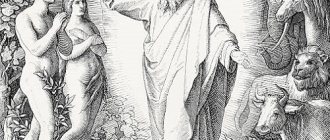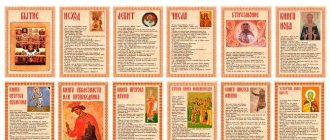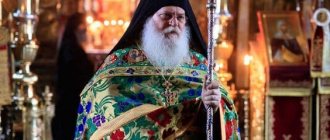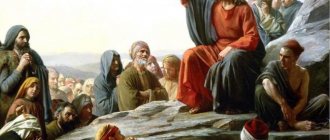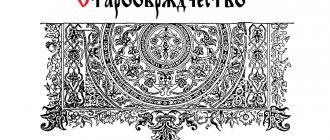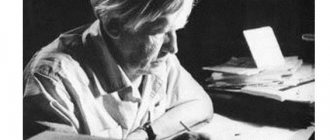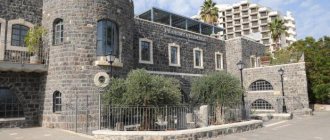Childhood and adolescence. Youth
Aurelius Augustine was born in 354, in the Numidian city of Tagaste (in northern Africa).
Augustine's father, a pagan, was a member of the city government and owned a small estate. Augustine's mother, Monica, a pious woman, unlike her husband, professed faith in Christ (she was later canonized by the Church). Despite the traditionally secondary position of women of that time in society, Monica's influence on her husband and son was still successful (in the end, her husband, Patricius, was baptized, even if not long before his death).
Although Augustine’s family did not beggar, they had modest incomes. Meanwhile, limited funds did not prevent the parents from providing their son with a good education. Initially, he studied in his hometown, then, from 363 to 366, he continued his education in Madaura. The next place of study, where he went as a fifteen-year-old youth, was Carthage.
Here Augustine made acquaintances with many peers. Moreover, not all of them led a chaste life. Having negative examples before his eyes, but not having a fully formed internal moral core, Augustine himself became involved in debauchery.
In Carthage, he met a woman, with whom he later, in 372, had a child. The son was named Adiodatus (in the Greek version - Theodore). Subsequently, Augustine more than once remembered him with fatherly love and tenderness.
Biography
The name of Blessed Aurelius Augustine is familiar not only to adherents of Orthodoxy, Catholicism and Lutheranism, but also to those who are interested in medieval philosophy and its dogmatics. The legendary “Confession”, created by him at the age of 43, is rightfully considered a treasury of world literature and a storehouse of wisdom - it presents not only the search for answers to eternal questions, but also the first autobiography of the author in history before reaching the age of Christ.
Spiritual quest
Some change in Augustine's worldview and worldview occurred when he was nineteen years old. Then, with funds sent by his mother, he acquired a manuscript of Cicero’s work “Hortensius”, in which he, with his characteristic persuasiveness, revealed the importance of wisdom as the highest good. This work had a strong psychological impact on Augustine, prompting him to think seriously about the meaning of life, including his own, and to compare his usual worldly values with eternal ones.
At some point, Augustine became sympathetic to the false teachings of the Manichaeans, who recognized two opposing principles: good and evil. Reading the Holy Scriptures did not evoke in him the proper feeling of reverence. And Augustine’s level of trust in Christianity was not high enough (perhaps this was due to his father’s pagan ideas). But his sympathy for Manichaeism was facilitated by the internal discord that was characteristic of him due to moral laxity and which he internally felt: on the one hand, a spiritual desire for something bright and sublime, and on the other hand, base carnal impulses. Why not a struggle between two principles, good and evil? The period of Augustine's passion for Manichaeism lasted almost 10 years, from approximately 373 to 382.
Having received the desired education in Carthage, Augustine returned to his small homeland, Tagasta, and got a job there as a grammar teacher. However, some time later he again moved to Carthage. Here, in addition to teaching, he seriously loaded himself with theoretical research in the field of natural sciences. Meanwhile, while comprehending the basics of astronomy, he studied, for example, astrology. His mother, who sincerely worried about him and moved to Carthage, closer to her son, still hoped that one day, with the help of God, he would turn around and retreat from harmful, sinful habits and false ideas.
Over time, Augustine began to have more and more questions to which Manichaeism could not give him a clear affirmative answer. Once, when Bishop Faustus, who enjoyed respect and authority among the Manichaeans, arrived in Carthage, Augustine approached him and bombarded him with awkward questions. After listening, Favst admitted that he was unable to satisfy his curiosity. Then Augustine experienced a certain disappointment in Manichaeism, although he appreciated the sincerity of the Manichaean bishop.
In 383, Augustine went to Rome, and after some time moved from there to Milan (Mediolan), where he received the position of rhetorician. Both as an inquisitive person and as a rhetorician, he was interested in hearing the sermons of the famous Bishop Ambrose (Mediolan). And he listened. And this hearing did not remain fruitless.
Philosophy of St. Augustine
Medieval systems of philosophy were religiously oriented towards Christian dogmas, one of which was the dogma of the personality of the one Lord.
His promotion is associated with the name of Augustine the Blessed. Thanks to this, the Christian branch of the West separated from the East, turning into Catholicism. Augustine is a prominent thinker of the Middle Ages who laid a powerful foundation for religious and philosophical thought, describing his beliefs in numerous works. He inspired many philosophical ideas and movements, and was also a teacher and mentor in scientific methodology, ethical, aesthetic and historical views.
Conversion to Christ
As Augustine attended Sunday services, in the rite of the catechumen, he became more and more captivated by the beauty of Orthodoxy. From the sermons of Bishop Ambrose, he learned for himself that the Christian doctrine represents a much richer and more sublime knowledge than he could have imagined. And although the former depravity made itself felt in the form of sinful movements in the soul, according to the Providence of God, he, step by step, approached Christ.
The mysterious incident made a great impression on him. One day, reflecting on his own sinfulness, being in contrition of spirit, he suddenly heard someone’s mysterious voice, as if a child’s, calling to him in a chant: “Take it and read.” Having looked around and not finding who could pronounce it, Augustine interpreted this appeal as an appeal from above. He realized that the object of reading was to be the Holy Scriptures. In turn, this appeal reminded him of the calling of Anthony the Great, whose life, at one time, made a strong impression on him. Augustine immediately returned to the place where he had left the Scripture and began to read. His attention focused on a phrase that warned against various dangers (feasts, drunkenness, sensuality, debauchery, envy, quarrels, lust in general) and called to put on Christ (Rom. 13:13-14).
In 388 or 389, Augustine finally received Baptism. This event could not but please his mother, a zealous Christian. Soon she rested in the Lord.
Philosophical beliefs of St. Augustine
Following Plotinus, divine existence according to Augustine is an absolute concept that should be considered in contrast to man and the universe. But, departing from the teachings of Plotinus, the theologian denies that God and the world are one. In his opinion, the existence of God is above nature, God himself is independent of the universe and humanity, while the world and man are completely dependent on the divine nature. Augustine considered God a person who is the creator of all things on earth.
Further, Augustine's creationism flows into fatalism, according to which nature and man are completely and directly dependent on the divine will, and God is constantly in charge of the world. This view of the universe is the basis of Augustinianism; it leads to an irrational interpretation of the world. Augustine imagined reality as filled with miracles that are beyond the control of the human mind.
The philosopher believes that angels and souls were created first. Everything else on earth is matter, which is an inert substrate without form. But 4 elements - earth, water, fire, air, as well as celestial bodies, were created once in a completed form.
Augustine's teaching denies the idea of evolution, but there are living creatures on earth whose development takes place almost throughout life. The philosopher explains this idea by germinal reasons.
Augustine considers the divine being to be eternal and unchangeable. The duality of God and nature is the contrast between God's existence and the ever-changing material world.
In the Augustinian era, the church was a strong link in society. She could have a serious influence in the political sphere.
Clergy
After the death of his mother, Augustine, after spending some time in Italy, went to his hometown of Tagasta. He inherited from his father, but he, having already firmly determined the direction of his future path, sold everything and donated the proceeds to the needs of the Church.
Soon Augustine moved to Ippon. By that time he had gained some fame as a defender of Christianity and a theologian. In 391, Bishop Valery, at the insistence of the local community, ordained him as a priest. Since then, Father Augustine became his faithful assistant in spreading the faith, preached a lot, was involved in the interpretation of Holy Scripture and the fight against heretical errors.
In 395, Father Augustine was elevated to episcopal dignity, and after the death of Bishop Valery, he headed the Ippon diocese and led it until his death.
Several years before his death, Blessed Augustine chose Heraclius as his successor. On August 28, 430, the heart of the bishop, exhausted by a fever, stopped, and he appeared before the Face of the Supreme Judge.
Mature age
The Thinker sells all his property and distributes money to the poor, turning into an ascetic and leaning towards monasticism. Having become a Christian, he makes a church career, but does not give up writing - at this time the most famous works come from his pen.
Clergy
The thinker returns to Africa and begins serving in the church of the city of Hippo and very soon becomes a bishop here after the death of his predecessor Valery. From now on he is called Augustine of Hippo - by this name the saint is often referred to to this day in the book tradition of the West.
A separate direction for the father of the church was the fight against heresies, which at that time were actively being introduced on the outskirts of the empire, especially among the barbarians - its new inhabitants. Africa was no exception. Therefore, the priest comes out in defense of the canonical church, seeing only in it the road to the salvation of the soul.
He actively preaches, speaks at meetings and as a judge, writes commentaries on biblical texts in order to eliminate discrepancies and heretical interpretations. The fight against the Donatists is being successfully waged, but the most fierce confrontation is unfolding with the Pelagians - supporters of this doctrine believed in the personal ability of a Christian to save without the participation of God. In 417, at the Council of Carthage, Augustine defeated Pelagius, and this heresy was condemned and prohibited.
Founding of the monastic community
Upon his return to Africa, Augustine also founded a monastic community in his native Tagaste. It was expected that it would become a spiritual center for the spread and strengthening of Christianity in the province. However, active missionary and administrative activities forced him to leave the community and continue his life as a monk at the episcopal residence in Hippo.
last years of life
The future teacher of the church for a long time did not approve of the cult of martyrs and the veneration of their relics, which at that time sometimes even became an object of trade. Even the authority of the spiritual father, Saint Ambrose, could not change this position. However, in 425 the relics of St. Stephen were transferred to Hippo. Traditions tell us about miracles of healing that happened soon. Augustine changes his position and now supports the veneration of relics in his sermons.
Meanwhile, clouds are gathering over the Roman Empire. The increasingly frequent invasions of barbarians are gradually drawing a line under the passing era of antiquity. Africa becomes a place of migration of conquerors - the Goths and Vandals who adopted Christianity in its heretical, Arian interpretation. The atmosphere of anxiety and the feeling of the collapse of the old world is reflected in Aurelius's later works devoted to eschatology. He dies during the siege of Hippo by the Vandals in 430 at the age of 75.
Creative heritage
Over the years of pastoral activity, dozens of works of various nature came from the pen of Blessed Augustine. As a church writer, he is well known as a preacher, as a dogmatist, and as a polemicist.
Unfortunately, not everything related to the work of this author can be accepted without reservations. One of the most contested areas of his author’s thought is the doctrine he presented in polemics with the Pelagians about the role of Divine grace in the matter of salvation. Objecting to the teachings of the heretics about the possibility of delivering a person from the filth of sin practically on his own, the blessed father rightly noted that without the assistance of grace this is in principle impossible to achieve, however, carried away by the heat of controversy, he so minimized the role of the person himself that in the future this gave rise and reason to form a new doctrine, representing the extreme opposite of Pelagianism: the doctrine of God's predestination (according to this doctrine, only those whom God predestined for salvation are saved).
Another controversial place in the writings of Augustine of Hippo is associated with his view of the Holy Spirit as the Spirit of Love. In further interpretation, this point of view formed the basis of the teaching of the Western Church about the procession of the Holy Spirit not only from the Father, but also from the Son (the essence of this teaching is as follows: the Father loves the Son and, therefore, destroys Love, but the Son also loves the Father and, therefore, also plagues Love; since Love is the Holy Spirit, it turns out that the Holy Spirit comes from both the Father and the Son).
Meanwhile, Blessed Augustine is rightfully revered as one of the most outstanding church writers on a universal scale.
From dogmatic treatises, such works have reached us as On the Trinity, On the City of God, On the Creed, Enchiridion, On 83 different questions in one book.
The following are known as polemical works: On free will, On the nature of good against the Manichaeans, On grace and free decision, On reproach and grace, On the predestination of the saints.
Pastoral teachings include: On the teaching of the catechumens, Sermons and teachings, the Word on the day of Peter and Paul, the Word on the appearance of Jesus Christ to the two disciples of Emmaus, etc.
A special group of works is determined by its exegetical orientation. These are: About the book of Genesis literally, About the agreement of the evangelists, Reasoning on the Gospel of John, Interpretation on Psalm 125, Christian Science or Foundations of Hermeneutics and Church Eloquence, etc.
Essays
More than 100 works have survived. A., in addition to letters and sermons. The most widely read of them is “Confession” (books 1–13; ca. 400), a kind of spiritual autobiography of A., written with sincerity and psychological depth unprecedented in antiquity and the Middle Ages. analysis, and “On the City of God” (books 1–22; 413–426) – apologetic. work created after the destruction of Rome by the Goths of Alaric in 410. The earliest op. – philosopher treatises in the spirit of Neoplatonism, written in 386–391: “Against the Academicians”, “On Order”, “Monologues”, “On the Quantity of the Soul”, etc. Contained in the treatise “On Music” (books 1–6; 387) the famous The definition “Musica est scientia bene modulandi” (“Music is the science of good singing”) has been repeatedly quoted and interpreted for a thousand years (Cassiodorus, Marcianus Capella, the anonymous treatise “Scolica Enchiriadis”, Aurelian of Reaume, the school of John de Muris, F. Gafuri and others). The most important op. A.: dogmatic - “On the Trinity” (books 1–15; 400–415), “Enchiridion to Lawrence on faith, hope and love” (421), “On 83 different questions” (389–396); exegetical - “On Christian Teaching” (books 1–4; 396–427), “On the Concord of the Evangelists” (books 1–4; 400), two commentaries on book. Genesis, interpretation of the Gospel of John, Psalms and Apostolic Epistles; moral and ascetic - “On abstinence” (394–395), “On patience” (418), “On holy virginity” (400–401), “On the good of widowhood” (414). Of particular interest are his polemics. essays. In the polemic against the Manichaeans [more than 10 works, including: “On Free Decision” (books 1–3; 388–399), “Against Faustus the Manichaean” (books 1–33; 397–398) ] the Augustinian theory of free will takes shape, in the struggle against the Donatists [“On Baptism against the Donatists” (books 1–7; 400)] - ecclesiology and philosophy of history. In disputes against supporters of Pelagius (see Pelagianism), the doctrine of grace and predestination is formulated: “On the baptism of infants” (books 1–3; 411–412), “On the grace of Christ and original sin” (books 1–2; 417 ), “Against Julian” (books 1–4; 421), “On Grace and Free Determination” (426–427), “On the Predestination of the Saints,” and “On the Gift of Perseverance [in Good]” (428–429). In addition, A. wrote against the Arians, Marcionites, and also compiled a set of all 88 heresies known to him and their refutation (“On Heresies,” 428–429). Shortly before his death, A. published 2 books of “Revisions”, in which, summing up everything he had written, he characterized 93 of his works, noting everything that was said in them that was incorrect.
Return
Augustine's further life was devoted to Christianity, worship and the church. Upon returning to his homeland, Augustine was appointed a priest in the city of Hippo, and then became a bishop. He was actively involved in the fight against all kinds of heresies, and became the author of numerous works devoted to Christian philosophy, including: “Confession”, “On the City of God”, “On the Trinity”.
With money left over from his parents, Augustine built a monastery, which became a refuge for himself and his few friends. In the last years of his life, Augustine was completely converted to faith - he spent all his free time fasting and reading prayers. He understood a truly Christian life as a life in solitude - at a distance from the outside world.
